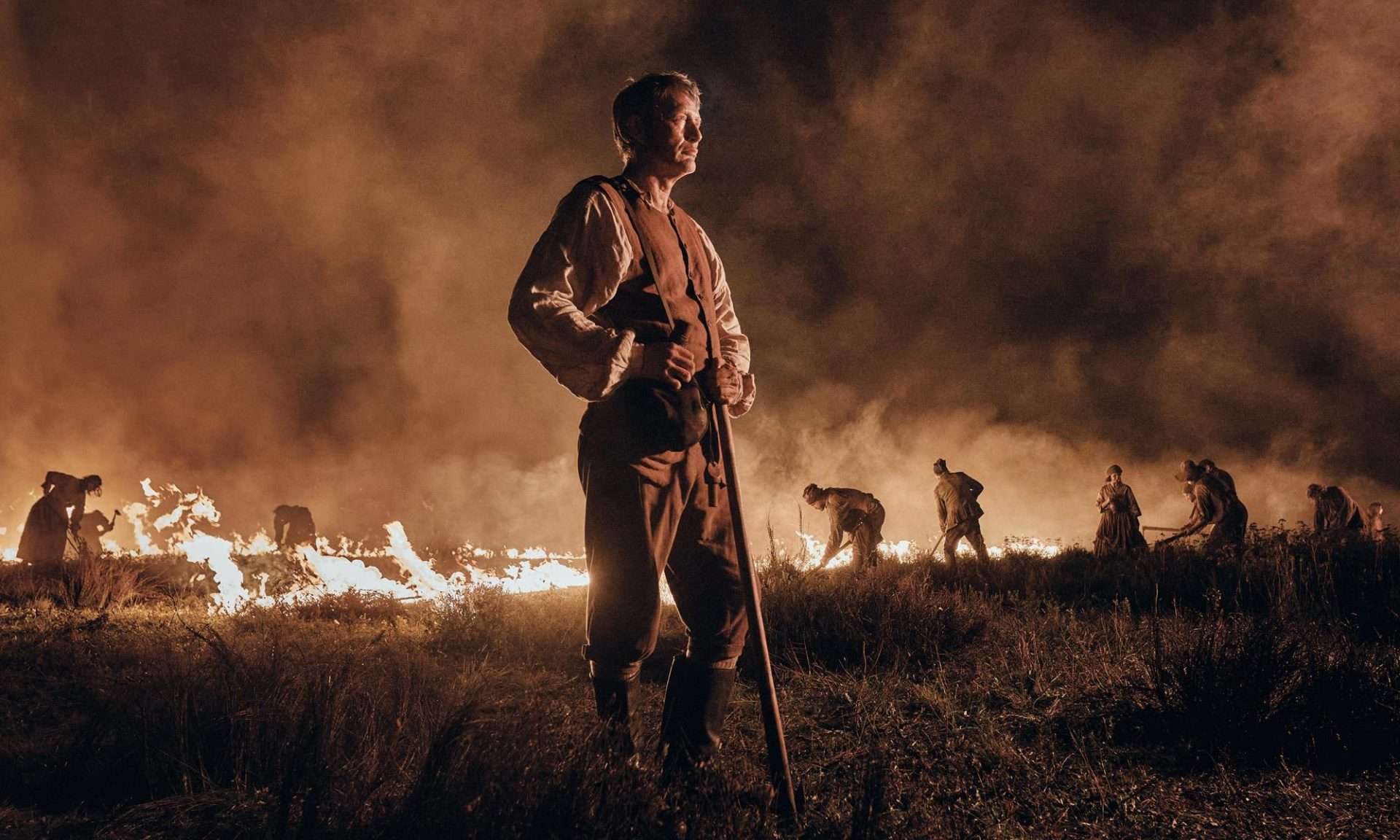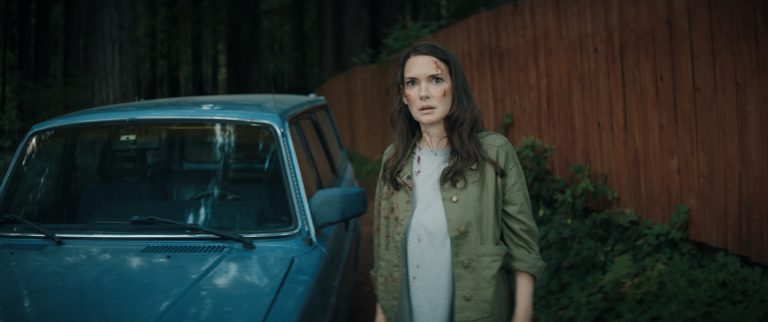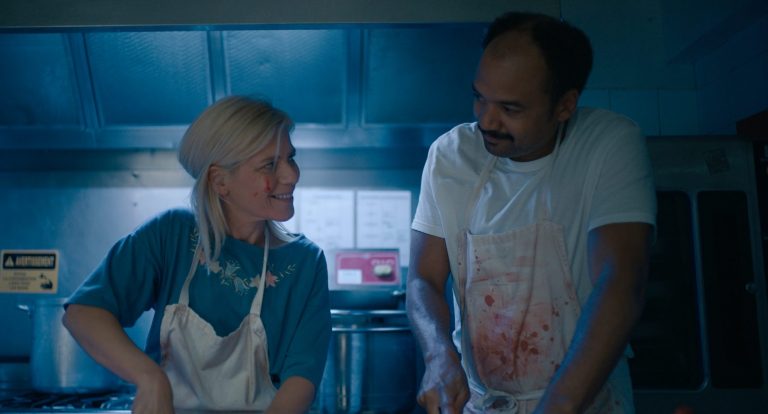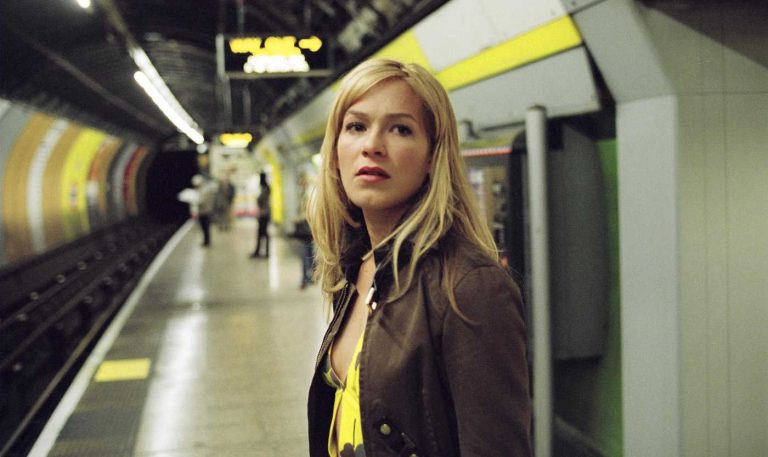Nikolaj Arcel’s The Promised Land (2023), Denmark’s official entry for the Oscars, is a sturdy, old-fashioned drama in the best sense. There is a classical rigor to its scale that juggles both the gargantuan and the intimate psychological jealousies. Boasting finely minute art direction rooted in the expansive ruggedness of the Danish countryside and grotesqueness of the landed gentry, the film is handsomely mounted by production designer Jette Lehmann. Arcel’s approach is more muscular instead of adopting a style and swagger common to historical epics. The tone is brooding but never becomes laborious despite skating close to it.
Opening in 18th-century Denmark, the film situates its conflicts around a piece of land in the countryside of Jutland, particularly contentious for being averse to cultivation and habitation. The heath cannot be tamed, we are told early on. However, the king is said to have a strong affinity to the land, and so is a retired army captain, Ludvig Von Kaplen (Mads Mikkelsen). Kahlen has returned home after twenty-five years and is now determined to make it arable and earn royal favor, unaffected by a jeering bunch of royal treasurers. He sets out for Jutland on his ambitious, fully self-financed pursuit with dogged perseverance and conviction that borders on the delusional, even though you eventually do buy into his vision of carving out a noble rank for himself that can help him ride past the deep, lifelong marginalization and abandonment of his lowly bastardized origins.
He gets an ally in the form of a local priest, Anton Eklund (Gustav Lindh), and seeks to build a settlement on the desolate, forbidding piece of land. Eklund persuades Kaplen to rope in a fugitive couple, Johannes (Morten Hee Andersen) and Ann Barbara (a terrific, fierce Amanda Collin), who has run away from the stranglehold of a tyrannical, abusive local landlord, Frederik De Schinkel (Simon Bennebjerg), who quickly emerges as Kaplen’s biggest rival and threat to his project.
Barbara becomes the housekeeper, and Johannes starts helping out Kaplen, tilling the land. There are also hovering German migrant outlaws occupying the precipices of Jutland, settled in the woods, and a sly little girl, Anmai Mus (Laura Bilgrau Eskild-Jensen), who comes sneaking in the middle of the night to steal from Kaplen’s provisions. Kaplen manages to make them join his endeavor, and for a brief while, the goal seems achievable. But the plans are diligently sullied by Schinkel, one of those quintessentially old-school hedonistic land barons who risks losing his power if settlements come up on the heath. Kaplen is not deterred; he soldiers on, convinced he ultimately has the upper hand with royal jurisdiction on his side.

Excluding a cursory account of his humble origins relayed in a taunt by Schinkel, there’s not much that’s shared about the captain’s life prior to his resolve to domesticate the land. This is an extraordinarily committed man, dead set on his purpose almost to a fault, who slowly realizes and learns to cherish the worth and meaning of forging and holding onto relationships. Describing him as “an odd master,” Ann Barbara remarks in amusement how Kaplen behaves like a fancy nobleman but in worn-out dresses.
Kaplen is detached and dispassionate in his emotional life, muted in demeanor, which strikes a studied contrast with the flamboyant monstrousness of Schinkel. As the antagonist, Schinkel is irredeemable, Bennebjerg cheerfully plays it at a high notch as he descends into the vilest acts, devising ploys to impede Kaplen’s progress and snuff out his allies. Schinkel operates with impunity, having an entire populace at his mercy and whim. He views Kaplen as someone who can directly challenge his unbridled authority.
The woman he pursues for marriage, his cousin, whom he has been hosting at his lavish place in the hope of sexual favors that he projects on every other housemaid, Edel Helene (Kristine Kujath Thorp), is non-reciprocating and cold. With both his lust for possession of a coveted woman and land in its attendant power slipping out of grasp, Schinkel’s appetite for retribution and re-ownership turns to bestial extremes, even as he is advised he might be straying too far and alienating the popular will. He, in his belief in life’s inherent chaos, continually strives to foil Kaplen’s faith, which holds that anything can be controlled. But at what cost, at what emotional and existential price does that quest and aspiration come at? Arcel’s film is deeply interested in this question that haunts Kaplen’s journey.
Kaplen starts out as someone who strongly believes in putting his ambition at the forefront, stifling and discarding anyone who might stand in its way. Together with Ann Barbara and Anmai Mus, he forms something like a family, albeit a precarious one. Mikkelsen turns in a beautifully subdued performance. In The Promised Land, Rasmuk Vidabaek’s camerawork is stately and elegant, which takes in with grandeur the rugged land, drenched in dawn and speckled with snow and mist. Arcel heavily relies on this to create an atmosphere that slowly sucks the viewer in but also knows how to pull the emotional strings without an ounce of manipulation.
The ending comes as too pat, but the real emotional crest of a conclusion arrives when the relationship between Anmai Mus and Kaplen comes full circle, tying an induction and a farewell. With Dan Romer’s deeply affecting music, it is in these moments that the film delivers a highly satisfying punch.
★★★★
The Promised Land screened at the Chicago International Film Festival 2023.
The Promised Land (2023) Movie Links: IMDb, Rotten Tomatoes
The Promised Land (2023) Movie Cast: Mads Mikkelsen, Gustav Lindh, Amanda Collin




![The Fabulous Filipino Brothers [2021] Review – A Personal Comedy That Fails To Hit The Right Spots](https://79468c92.delivery.rocketcdn.me/wp-content/uploads/2022/02/The-Fabulous-Filipino-Brothers-2021-768x432.jpg)

![Clay’s Redemption [2020] Review: A messy, repetitive Midnight movie that fizzles out even before it kicks off!](https://79468c92.delivery.rocketcdn.me/wp-content/uploads/2021/02/Clays-Redemption-highonfilms-1-768x432.jpg)

